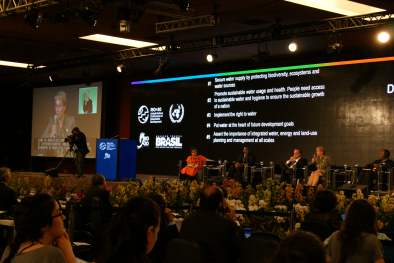The panel focused the dialogue on the following recommendations:
- Put water at the heart of future development goals.
- Assert the importance of integrated water, energy and land-use planning and management at all scales.
- Improve water and sanitation facilities to ensure the education of children.
- Strengthen solidary financing mechanisms.
- Adopt more ambitious global policies to address water and sanitation needs.
- Build a common vision and adopt an action plan at the global level regarding wastewater management.
- Promote sustainable water usage and health. People need access to sustainable water and hygiene to ensure the sustainable growth of a nation.
- Expand and strengthen global mechanisms for the monitoring of water, sanitation and hygiene.
- Secure water supply by protecting biodiversity, ecosystems and water sources.
Dr Grobicki thanked the Brazilian government for the impressive online democracy that they are providing with the forum. Relating today’s conference to the formation of GWP at Rio 1992, Dr Grobicki talked about momentum at the conference and to make sure it is continued. It is a matter of opportunity, integrity, and solidarity to make sure we are working together for sustainability”, she said. Citing an Africa proverb, Dr Grobicki concluded, “If you want to go fast, go alone. If you want to go far, go together.”
At the close of the Water Dialogue, “Assert the importance of integrated water, energy and land-use planning and management at all scales” was acknowledged as one of the most important recommendations on water that the Brazilian government will communicate to the country delegates at the negotiations. The IWRM approach, such as multi-stakeholder participation, open platforms for dialogue and integrating various sectors, are still the answers to the questions on how we can achieve water security.

